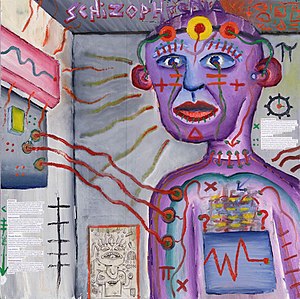
Schizophrenia

Schizophrenia is a mental disorder characterized by abnormal behavior, strange speech, and a decreased ability to understand reality. Other symptoms may include false beliefs, unclear or confused thinking, hearing voices that do not exist, reduced social engagement and emotional expression, and lack of motivation. People with schizophrenia often have additional mental health problems such as anxiety, depression, or substance-use disorders. Symptoms typically come on gradually, begin in young adulthood, and, in many cases, never resolve. The causes of schizophrenia include environmental and genetic factors. Possible environmental factors include being raised in a city, cannabis use during adolescence, certain infections, the age of a person's parents, and poor nutrition during pregnancy. Genetic factors include a variety of common and rare genetic variants. Diagnosis is based on observed behavior, the person's reported experiences and reports of others familiar with the person. During diagnosis, a person's culture must also be taken into account. As of 2013, there is no objective test. Schizophrenia does not imply a 'split personality' or dissociative identity disorder, conditions with which it is often confused in public perception. The mainstay of treatment is antipsychotic medication, along with counselling, job training, and social rehabilitation. It is unclear whether typical or atypical antipsychotics are better. In those who do not improve with other antipsychotics, clozapine may be tried. In more serious situations where there is risk to self or others, involuntary hospitalization may be necessary, although hospital stays are now shorter and less frequent than they once were. About 0.3% to 0.7% of people are affected by schizophrenia during their lifetimes. In 2013, there were an estimated 23.6 million cases globally. Males are more often affected and onset is on average earlier in age. About 20% of people eventually do well, and a few recover completely. About 50% have lifelong impairment. Social problems, such as long-term unemployment, poverty, and homelessness, are common. The average life expectancy of people with the disorder is 10–25 years less than that of the general population. This is the result of increased physical health problems and a higher suicide rate (about 5%). In 2015, an estimated 17,000 people worldwide died from behavior related to, or caused by, schizophrenia. People with schizophrenia may experience hallucinations (most reported are hearing voices), delusions (often bizarre or persecutory in nature), and disorganized thinking and speech. The last may range from loss of train of thought, to sentences only loosely connected in meaning, to speech that is not understandable known as word salad. Social withdrawal, sloppiness of dress and hygiene, and loss of motivation and judgment are all common in schizophrenia. Distortions of self-experience such as feeling as if one's thoughts or feelings are not really one's own to believing thoughts are being inserted into one's mind, sometimes termed passivity phenomena, are also common. There is often an observable pattern of emotional difficulty, for example lack of responsiveness. Impairment in social cognition is associated with schizophrenia, as are symptoms of paranoia. Social isolation commonly occurs. Difficulties in working and long-term memory, attention, executive functioning, and speed of processing also commonly occur. In one uncommon subtype, the person may be largely mute, remain motionless in bizarre postures, or exhibit purposeless agitation, all signs of catatonia. People with schizophrenia often find facial emotion perception to be difficult. It is unclear if the phenomenon called 'thought blocking', where a talking person suddenly becomes silent for a few seconds to minutes, occurs in schizophrenia. About 30 to 50 percent of people with schizophrenia fail to accept that they have an illness or comply with their recommended treatment. Treatment may have some effect on insight.
